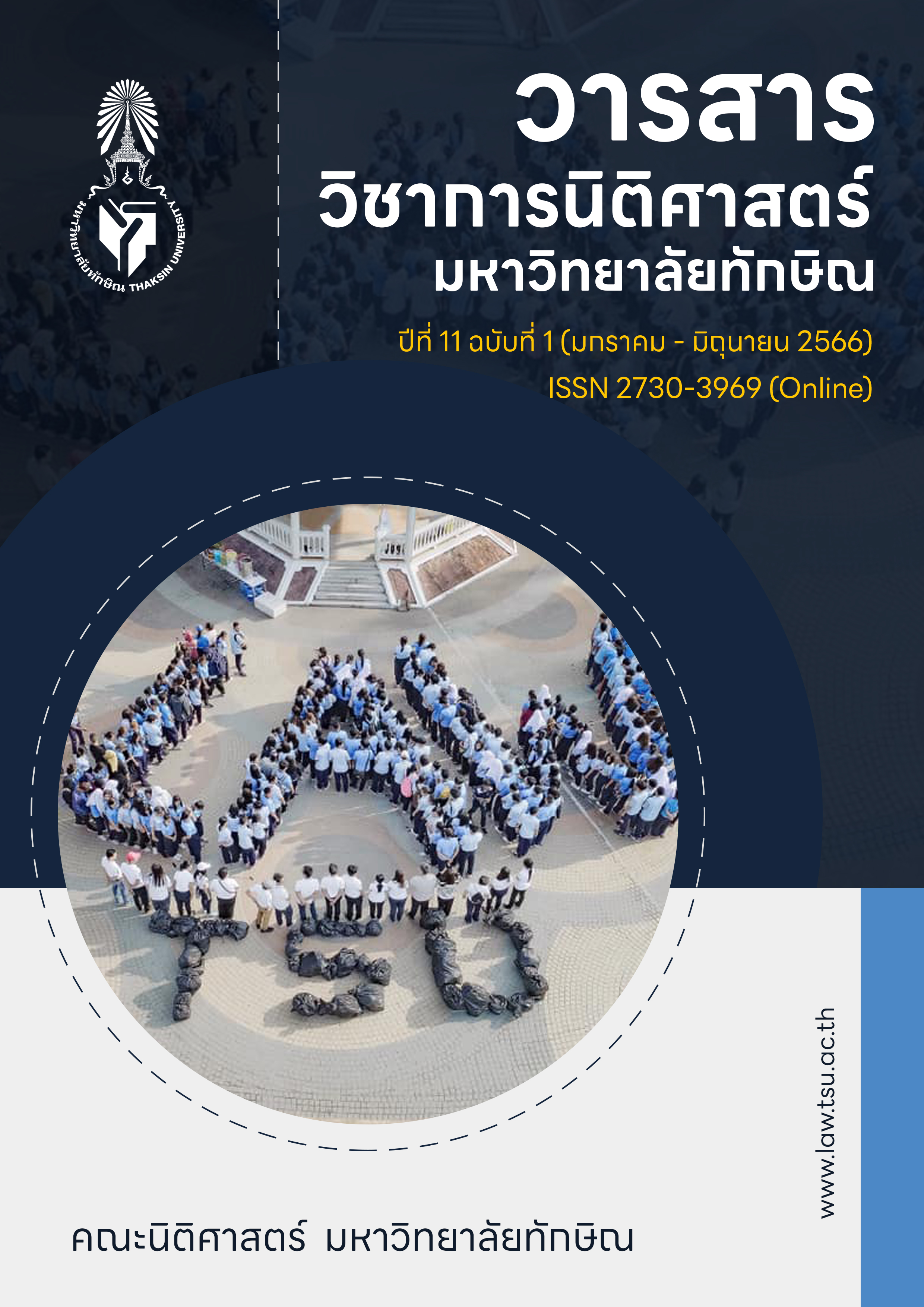ปัญหาการคุ้มครองข้อมูลเครดิตทางเลือกภายใต้ กรอบการคุ้มครองข้อมูลส่วนบุคคลตามกฎหมายไทย
บทคัดย่อ
บทความวิจัยนี้มีวัตถุประสงค์เพื่อให้ทราบถึงแนวทางการแก้ไขปัญหาเชิงวิเคราะห์
ในการคุ้มครองข้อมูลเครดิตทางเลือกที่เหมาะสมโดยศึกษาเปรียบเทียบกับมาตรการระหว่างประเทศและเสนอแนวทางแก้ไขกฎหมายคุ้มครองข้อมูลส่วนบุคคลที่เกี่ยวข้องกับข้อมูลเครดิตทางเลือก
ในประเทศไทย
งานศึกษานี้ใช้วิธีดำเนินการวิจัยเชิงคุณภาพ โดยศึกษาความเป็นมา คำนิยาม และแนวคิดของข้อมูลเครดิตทางเลือกศึกษาขอบเขตและมาตรการทางกฎหมายในการคุ้มครองข้อมูลส่วนบุคคล
ที่เกี่ยวข้องกับข้อมูลเครดิตทางเลือก และวิเคราะห์ปัญหาทางกฎหมายเกี่ยวกับคำนิยามและมาตรการทางกฎหมายในการเก็บรวบรวมข้อมูลส่วนบุคคลที่เกี่ยวข้องกับข้อมูลเครดิตทางเลือกจากรายงาน
เชิงเทคนิค งานวิจัย วารสาร ตัวบทกฎหมาย กรอบและมาตรการสากล ตำรา บทความ ทั้งของประเทศไทยและต่างประเทศ
ผลการศึกษาพบว่า(1) ข้อมูลเครดิตทางเลือกมีขอบเขตและประเภทของข้อมูลที่กว้างขวางโดยสามารถเป็นได้ทั้งข้อมูลส่วนบุคคล ข้อมูลอ่อนไหว หรืออาจอนุมานได้จากข้อมูลเครดิตแบบดั้งเดิม(2) ข้อมูลเครดิตทางเลือกสามารถอยู่ภายใต้การคุ้มครองตามพระราชบัญญัติการประกอบธุรกิจข้อมูลเครดิต พ.ศ. 2545 และพระราชบัญญัติคุ้มครองข้อมูลส่วนบุคคล พ.ศ. 2562 ขึ้นอยู่กับประเภทของข้อมูลและความสามารถในการอนุมานข้อมูล(3)คำนิยามและข้อกำหนดในการเก็บรวบรวมข้อมูลเครดิตทางเลือกที่ถือเป็นข้อมูลอ่อนไหวภายใต้กฎหมายทั้งสองฉบับมีความไม่สอดคล้องกันโดยมาตรา 10 ของพระราชบัญญัติการประกอบธุรกิจข้อมูลเครดิต พ.ศ. 2545 ไม่อนุญาตให้มีการจัดเก็บข้อมูลห้ามจัดเก็บซึ่งครอบคลุมถึงข้อมูลอ่อนไหวบางประเภทในขณะที่มาตรา 26 ของพระราชบัญญัติคุ้มครองข้อมูลส่วนบุคคล พ.ศ. 2562 กำหนดให้สามารถเก็บรวบรวมข้อมูลอ่อนไหวหากได้รับความยินยอมอย่าง
ชัดแจ้งจากเจ้าของข้อมูลโดยหากข้อมูลดังกล่าวถูกนำไปใช้ในทางที่ไม่เหมาะสมอาจกระทบต่อสิทธิส่วนตัวและสิทธิขั้นพื้นฐานของเจ้าของข้อมูลดังนั้น งานศึกษานี้จึงเสนอให้แก้ไขคำนิยามและข้อกำหนดในการเก็บรวบรวมข้อมูลเครดิตทางเลือกที่ถือเป็นข้อมูลอ่อนไหวภายใต้พระราชบัญญัติการประกอบธุรกิจข้อมูลเครดิต พ.ศ. 2545 และพระราชบัญญัติคุ้มครองข้อมูลส่วนบุคคล พ.ศ. 2562ดังกล่าวให้เป็นไปในแนวทางเดียวกัน
เอกสารอ้างอิง
The US Bureau of Consumer Financial Protection, February 21, 2017. Request for Information Regarding Use of Alternative Data and Modeling Techniques in the Credit Process, p 11185. Retrieved fromhttps://www.federalregister.gov/documents/2017/02/21/2017-03361/request-for-information-regarding-use-of-alternative-data-and-modeling-techniques-in-the-credit(accessed February 15, 2020).
Personal Data Protection Act 2019, Thailand, Section 6
Paterson, M., & McDonagh, M.(2018). Data protection in an era of big data:The challenges posed by big personal data. Monash University Law Review, 44(1), 1-31.
Ibid.
Christman, J. (2008). Autonomy in moral and political philosophy. Stanford encyclopedia of philosophy.
Ibid.
Wilairat,Y. (2017). Problems on “Credit Information” under the Law Relating to Credit Information Business. [Bangkok: Thammasat University]. Available at http://ethesisarchive.library.tu.ac.th/thesis/2017/TU_2017_5801033159_8937_9011.pdf (accessed December 15, 2021).
Srichola, S. &Tipayanee, P. (2021). Legal Issues Related to Credit Information on the Use of Credit Information for Other Purposes. [Bangkok: Dhurakij Pundit University] 4.
Khaosanit, D. (2018). Legal measures to protect personal data: a study of Thana's financial and banking case. [Bangkok: Dhurakij Pundit University] 215. Available (in Thai language) at http://libdoc.dpu.ac.th/thesis/Dawan.Kha.pdf (accessed December 15, 2021).
Hunt, R. M. (2002). What's in the file? The economics and law of consumer credit bureaus. Business Review, (Q2), 17-25.
See Supra note [1] The US Bureau of Consumer Financial Protection, February 21, 2017.
International Committee on Credit Reporting (ICCR), March 2018. Use of Alternative Data to Enhance Credit Reporting to Harness DigitalFinancial Services to Individualsand SMEs operating in the Informal Economy. Available at https://www.gpfi.org/publications/guidance-note-use-alternative-data-enhance-credit-reporting-enable-access-digital-financial-services (Accessed February 7, 2023).
Kraemer, F., Van Overveld, K., & Peterson, M. (2011). Is there an ethics of algorithms?.Ethics and Information Technology,13( 3), 251-260.
Personal Data Protection Act 2019, Thailand, Section 6.
Personal Data Protection Act 2019, Thailand, Section 3.
Personal Data Protection Act 2019, Thailand, Section 4 (6)
The Credit Information Business Act 2002,Thailand, Section 3.
OECD (2013), The OECD Guidelines Governing the Protection of Privacy and Transborder Flows of Personal Data. Retrieved from www.oecd.org/internet/ieconomy/oecd_privacy_framework.pdf(accessed February 15, 2020).
OECD (2015), Data-Driven Innovation: Big Data for Growth and Well-Being, OECD Publishing, Paris. http://dx.doi.org/10.1787/9789264229358-en(accessed February 15, 2020).
Personal Data Protection Act 2019, Thailand, Section 26.
General Data Protection Regulation, Art. 9.
Greenleaf, G. &Suriyawongkul, A., Thailand – Asia’s Strong New Data Protection Law (September 24, 2019). 160 Privacy Laws and Business International Report 1, 3-6, 2019, Available at SSRN: https://ssrn.com/abstract=3502671
Credit Information Business Act 2002, Thailand, Section 3 and 10.
See Supra note [1] The US Bureau of Consumer Financial Protection, February 21, 2017.
CJEU C‑184/20, OT v Vyriausiojitarnybinesetikoskomisija, ECLI:EU:C:2022:601.
Personal Data Protection Act 2019, Thailand, Section 26.
Personal Data Protection Act 2019, Thailand, Section 19, para. 2.
Section 26 of the PDPA prescribes other exceptions for the collection of sensitive personal data. For instance, prevent a danger to life, body or health of the person, where the data subject is incapable of giving consent; carried out in the course of legitimate activities with appropriate safeguards by the foundations, associations or any other not-for-profit bodies with a political,religious, philosophical,or trade union purposes; it is necessary for the establishment, compliance, exercise or defense of legal claims; it is necessary for compliance with a law to achieve the certain purposes.
MacMillan, Rory. "Big Data, Machine Learning, Consumer Protection and Privacy." Paper presented at the 47th Research Conference on Communication, Information and Internet Policy, American University, Washington College of Law, Washington, D.C., 26 July 2019) 9.
ดาวน์โหลด
เผยแพร่แล้ว
ฉบับ
ประเภทบทความ
สัญญาอนุญาต
ลิขสิทธิ์ (c) 2023 วารสารวิชาการนิติศาสตร์ มหาวิทยาลัยทักษิณ

อนุญาตภายใต้เงื่อนไข Creative Commons Attribution-NonCommercial-NoDerivatives 4.0 International License.
บทความที่ได้รับการตีพิมพ์เป็นลิขสิทธิ์ของวารสารวิชาการนิติศาสตร์ มหาวิทยาลัยทักษิณ
ข้อความที่ปรากฏในบทความแต่ละเรื่องในวารสารวิชาการเล่มนี้เป็นความคิดเห็นส่วนตัวของผู้เขียนแต่ละท่านไม่เกี่ยวข้องกับคณะนิติศาสตร์ มหาวิทยาลัยทักษิณ และคณาจารย์ท่านอื่นๆในมหาวิทยาลัยฯ แต่อย่างใด ความรับผิดชอบองค์ประกอบทั้งหมดของบทความแต่ละเรื่องเป็นของผู้เขียนแต่ละท่าน หากมีความผิดพลาดใดๆ ผู้เขียนแต่ละท่านจะรับผิดชอบบทความของตนเองแต่ผู้เดียว



